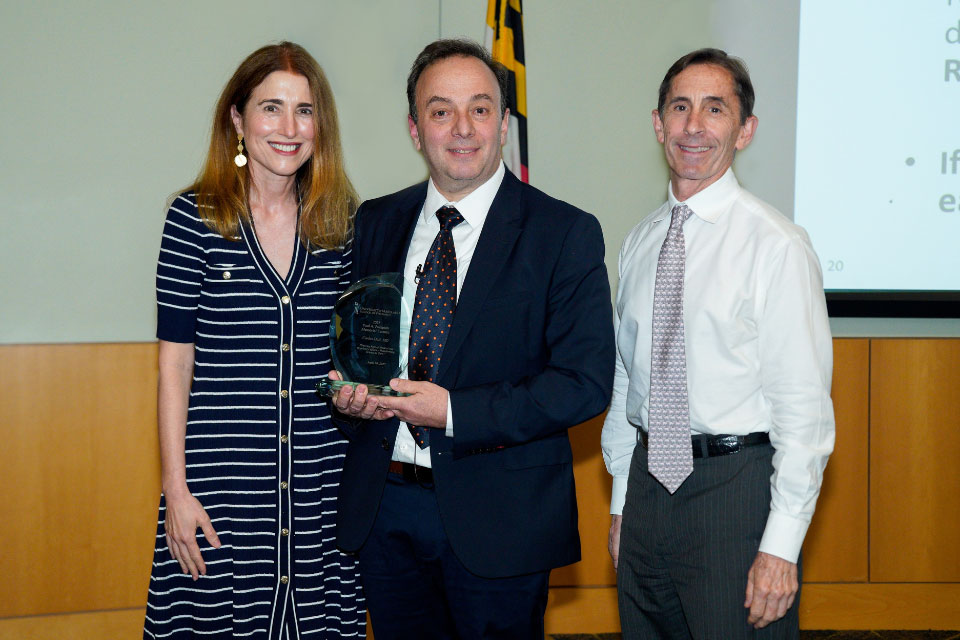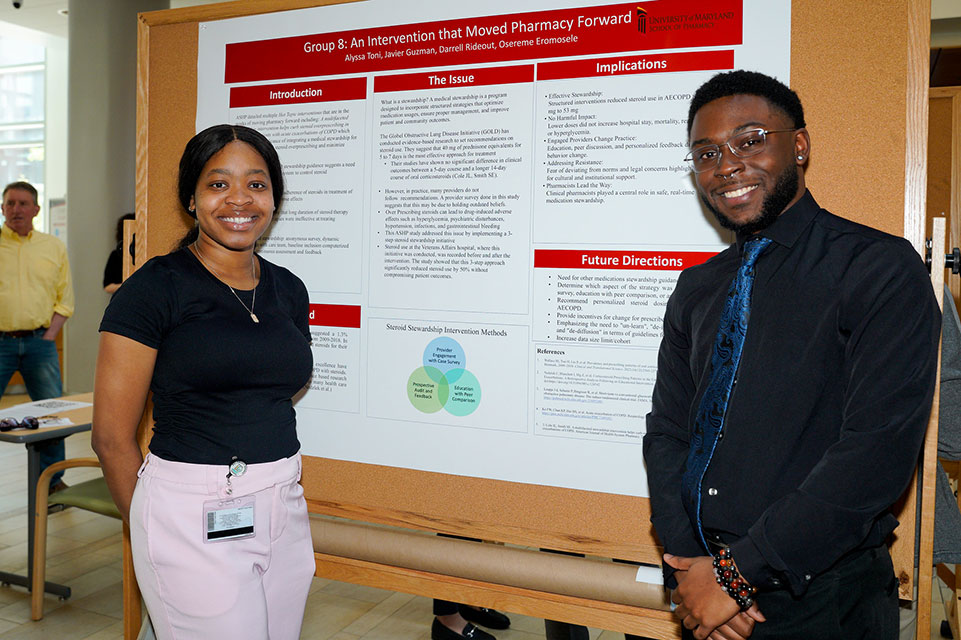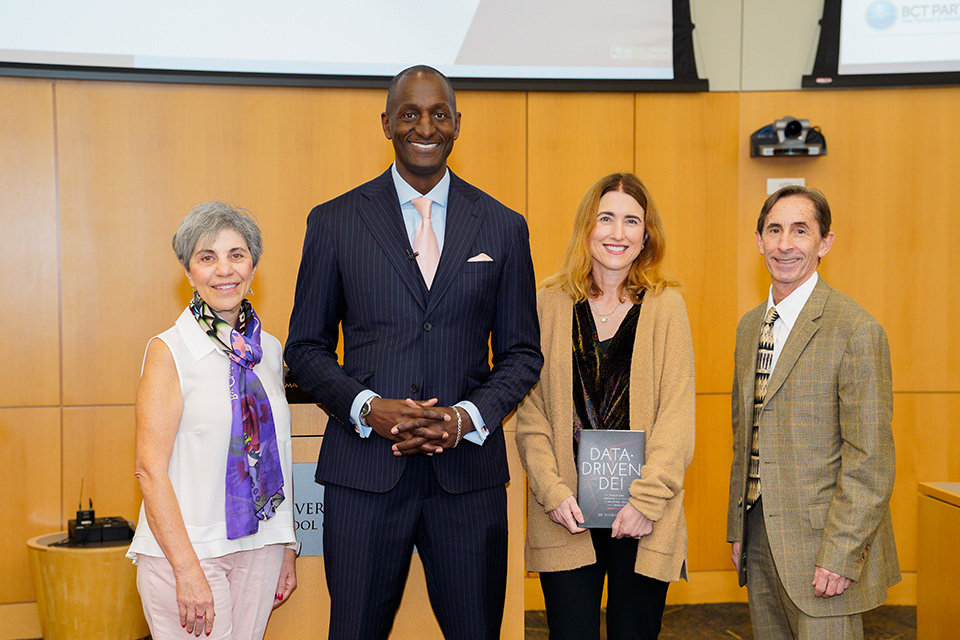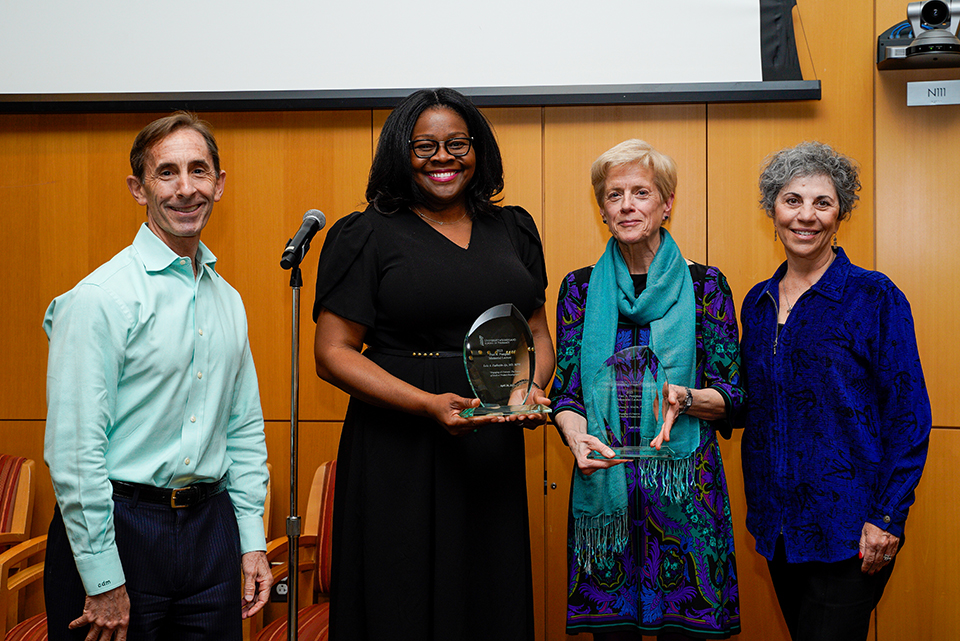Industry Trailblazer Inspires Future Pharmacists to Lead with Purpose at Annual Pumpian Lecture
Carlos Doti urges students to view pharmacy as a platform for advancing access, equity, and innovation in health care.

By Pam Carder
May 22, 2025
Photo: Dean Sarah L.J. Michel, PhD; Carlos Doti, MD; and C. Daniel Mullins, PhD
The University of Maryland School of Pharmacy (UMSOP) welcomed Carlos Doti, MD, vice president of U.S. Medical Affairs Oncology at AstraZeneca, as the 2025 speaker for the Paul A. Pumpian Memorial Lecture on April 30.
In introductory remarks, C. Daniel Mullins, PhD, professor of practice, sciences, and health outcomes research and executive director of the PATIENTS Program at UMSOP, reflected, “The Pumpian Memorial Lecture honors leaders who challenge us to think differently. Dr. Doti exemplifies how pharmacists and clinicians can transform systems from within, bringing science, policy, and compassion together to create real-world impact.”
Delivered to an audience of students, faculty, and staff, Doti offered a compelling vision for how pharmacy professionals can reshape the future of health care—by harnessing the systems around them to serve the greater good.
His lecture, titled “The Evolving Role of Medical and Regulatory Affairs – Transforming Science to Care,” drew from Doti’s global experience in medicine and the pharmaceutical industry. But above all, his message was focused on student pharmacists — urging them to recognize their potential as future leaders in health care innovation, access, and equity.
“You’re not just graduating into jobs—you’re entering systems,” said Doti. “And those systems need people like you who understand how science connects to patients.”
Doti emphasized the growing strategic role of medical affairs professionals in bridging the gap between research, regulation, and patient access. He encouraged students to consider nontraditional career paths in pharmaceutical industry roles—especially in medical affairs and regulatory strategy—where pharmacists’ clinical understanding is in high demand. “I wish more PharmDs would apply [to roles at AstraZeneca],” he said. “Pharmacists understand the journey from central pharmacy to bedside. That experience matters deeply.”
A central theme of the lecture was how pharmacists and other medical professionals can use their roles to create change within existing systems—from expanding access to clinical trials in underserved communities to influencing regulatory policy and drug development strategy.
“Access is more than approvals,” Doti noted. “It is about equity. It’s about making sure that someone in a small-town clinic can receive the same level of care as someone in a major academic medical center.”
Doti also offered a guiding principle he frequently shares with his own team: “We’re not in the business of selling drugs—we’re in the business of granting access.” That mission, he stressed, requires not only scientific evidence but also trust, strategic communication, and real collaboration with all stakeholders—from regulators to patients.
He also spoke about the evolving expectations in the pharmaceutical field—from evidence generation to digital health—to underscore how pharmacy graduates can position themselves as critical partners in improving patient outcomes. Tools like AstraZeneca’s “AZ Brain” are being used to predict where rare cancers may occur, enabling targeted educational outreach. These innovations, he stressed, need people behind them who care not just focused on efficacy, but focused on patients. “Technology is a tool,” he said. “But you—all of you—are the ones who make it meaningful.”
During the lecture, Doti offered practical advice for students interested in industry careers, highlighting entry-level roles such as the medical science liaison — scientific experts who connect pharmaceutical companies with health care professionals by sharing clinical insights, supporting research, and informing strategy. Doti emphasized that pharmacists’ patient care training makes them well-suited for the role. “Make your decision early,” he urged. “If the pharmaceutical industry is the path for you, start exploring now.”
Sarah L.J. Michel, PhD, dean of UMSOP and professor of pharmaceutical sciences, expressed gratitude to Doti for his inspiring message. “You’ve challenged our students not just to think about where they’re going,” she said, “but who they want to be—and what kind of impact they can make.”



